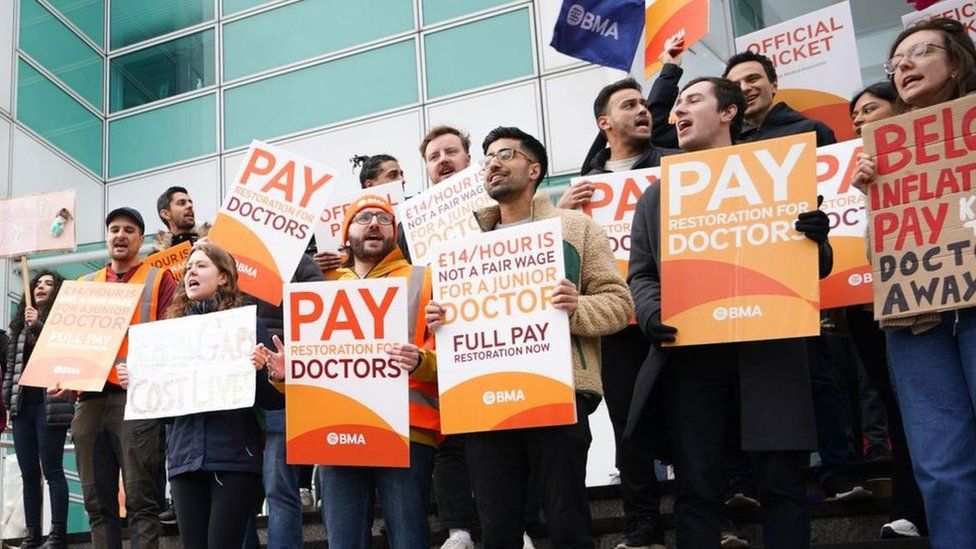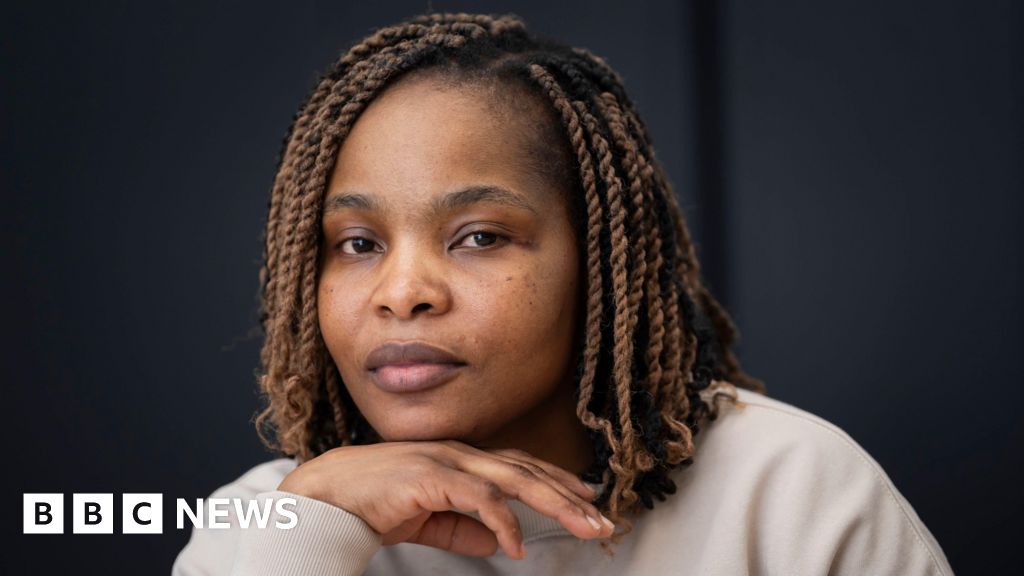ARTICLE AD BOX
 Image source, PA Media
Image source, PA Media
By Catherine Burns
Health correspondent, BBC News
The government has rejected calls to bring in the conciliation service Acas to help end the junior doctors' strike.
The BMA, which represents junior doctors, says it believes working with Acas gives "the most realistic chance" of ending the strike in England.
The NHS Confederation, which represents managers, has written to the BMA and the health secretary, asking them to consider this "as a matter of urgency".
The government has previously said it is "willing to engage" with the BMA.
Acas (The Advisory, Conciliation and Arbitration Service) could act as a third party to help bring about an agreement between the two sides. But it is a voluntary process and can only take place if both sides are willing to engage with it.
So why has there been so little progress in this row?
For a start, there is a huge gulf between the two sides' demands.
The junior doctors say only a 35% pay increase can make up for 15 years of below-inflation wages.
The government says that proposition is "unreasonable" and that talks can only happen if the BMA moves "significantly" away from this.
There were some negotiations after the previous walkout by junior doctors in March - but they were brief, and ultimately unsuccessful.
Lord Warner, a former health minister and now a cross-party peer, says the current government approach "just looks obstinate" and that, were he in the same position, he would be talking to junior doctors.
He believes their 35% pay demand is "a starter for 10" , adding that the junior doctors probably "know they've got to get into single figures".
He says tricky negotiations often involve back channels or unofficial conversations behind the scenes.
But the co-chair of the BMA's junior doctors' committee, Dr Vivek Trivedi, says that is not happening here.
He insists: "Behind the scenes is actually what you see in public. We're ready to negotiate - and want to - but we're being met with nothing but silence and refusal to come to the table."
Could Acas make any difference?
The letter from NHS Confederation chief executive Matthew Taylor is very clear. It says: "The current approach is not working."
He warns that it is potentially putting patients at risk, amid continuing industrial action, and suggests that Acas, or another mediation service, could help bring the strike to an end.
He says this letter is more than a symbolic gesture - and points out that Acas helped resolve the last junior doctors' strike in 2016.
The BMA Chair of Council, Prof Philip Banfield, agrees.
He says: "We believe that working with Acas provides the most realistic chance of a successful outcome to the negotiations.
"It takes both sides of a dispute to want to find a solution, and we urge the health secretary to show the same willingness that we have and make himself available and open to talks facilitated by Acas."
Lord Warner isn't convinced that Acas can help right now, saying "it's not a worker of miracles".
He says it is "very good at building bridges between river banks when they're not too far apart, when there's some degree of touching distance.
"There is no touching distance here," he adds.
What does the government say?
Health Secretary Steve Barclay said on Tuesday this week that the government had shown it was "willing to engage in meaningful and constructive talks", but added the 35% pay increase was "not reasonable".
"My door is open and we remain willing to engage constructively with the junior doctors," he said.
"But clearly a demand of 35%, which would involve some junior doctors receiving over £20,000 more in terms of their basic pay, is not reasonable to your viewers - to those who have to balance the wider issues of the economy and getting inflation down alongside recognising the very real pressures that the NHS and junior doctors have been under, not least from the pandemic."
What about the other health unions?
It's impossible to see the junior doctors' dispute in isolation.
Other NHS staff, including nurses, ambulance workers and physios, have also walked out this winter.
Their unions in England did manage to negotiate with the government and come up with a pay offer, including a 5% rise and a lump-sum payment. Currently, members are voting whether or not to accept that offer.
The ballot for the Royal College of Nursing and Unison closes on Friday - with results expected shortly afterwards.
Matthew Taylor thinks the timing could be relevant. He suggests that there "may be those in government who feel that it's worth holding out against negotiation to see what happens in the nurses and paramedics ballot".
Dr Manuela Galetto, co-director of the Industrial Relations Research Unit at Warwick Business School, says ministers might "be using the strategy of waiting for the nurses to accept the 5%" so they could argue that junior doctors should accept it too.
This strategy is not risk-free. For a start, there is no guarantee the other unions will accept the pay offer.
And in the meantime, there is the risk to patient safety during continuing strikes.
But for now, it seems the two sides cannot even agree on the best way to break the impasse between them.

 1 year ago
39
1 year ago
39








 English (US) ·
English (US) ·